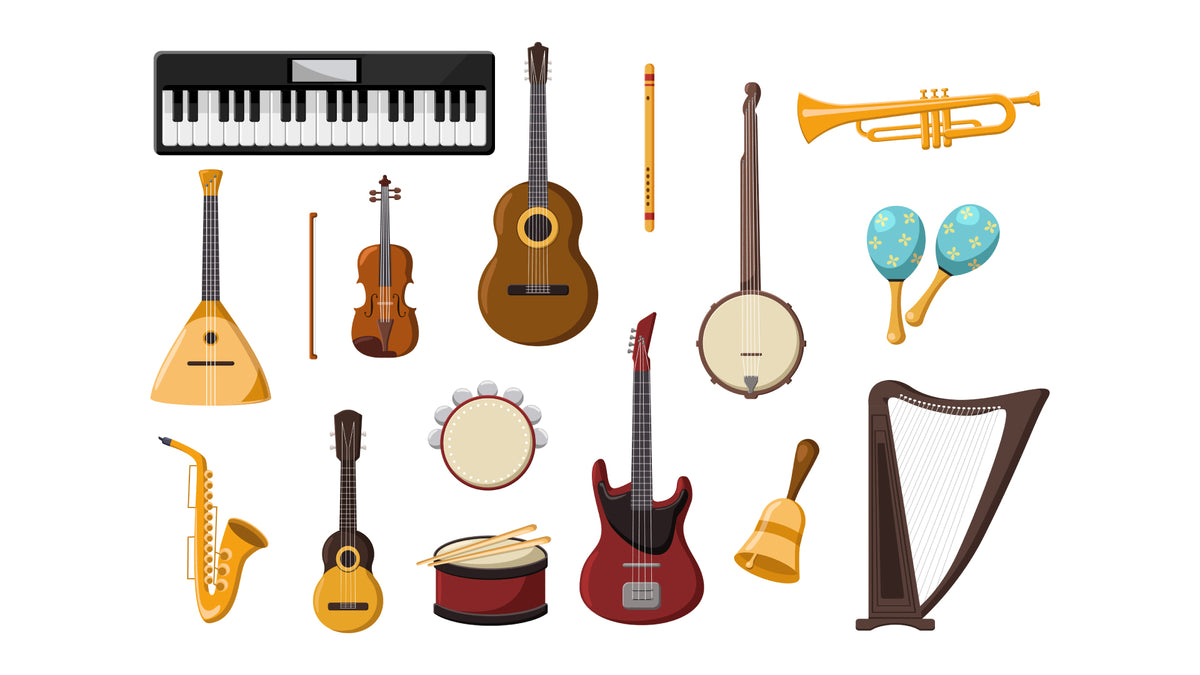Recorder songs are simple melodies played on a small woodwind instrument called a recorder. Recorder songs are popular for beginners and children learning to play music.
Learning to play the recorder is a great way to introduce a child to the joys of music. It is a simple instrument, easy to learn, and affordable. Due to its simplicity, recorder songs are a great way to teach children how to read music and play simple tunes.
Many songs can be played using only the basic notes and fingerings of the recorder. This makes it convenient for beginners just starting on their musical journey. With a little bit of practice, children can quickly progress and learn to play more challenging recorder songs. In this article, we will explore some popular recorder songs for beginners and young children.

Credit: kkmusicstore.com
Picking The Right Recorder
Discuss The Different Types Of Recorders Available For Beginners
If you’re a beginner at playing the recorder, there are a few different types available for you to choose from. Here are some of the most common options:
- Soprano recorder: This is the most common type of recorder and is perfect for beginners. This instrument has a high-pitched, bright sound and is easy to learn.
- Alto recorder: This recorder is lower than the soprano and has a more mellow sound. It’s a good option for those who want a deeper sound and are comfortable with a larger instrument.
- Tenor recorder: This is the largest type of recorder and has a low, warm sound. It’s a good option for those who want to play bass or lower parts in a recorder ensemble.
Explain The Criteria To Consider When Choosing The Right Recorder For Playing Music
Choosing the right recorder is essential for getting the best sound and playing experience. Here are some key criteria to keep in mind:
- Size: The size of the recorder will affect the sound and ease of playing. Smaller recorders, like the soprano, are easier to play for beginners, while larger recorders like the tenor are better for experienced players.
- Material: Recorders can be made of wood or plastic. Wood recorders have a richer sound, but are more expensive and require more maintenance. Plastic recorders are more affordable and durable but may not have as warm a sound as wooden ones.
- Price: Consider your budget when choosing a recorder. Plastic recorders tend to be the least expensive, while wooden ones can be quite costly.
Provide Options Suitable For Beginners At Different Price Ranges
Whether you’re looking for an affordable plastic instrument or a more professional wooden recorder, there are plenty of options available for beginner players. Here are some recommendations at different price points:
- Budget-friendly (under $20): Yamaha yrs-23, aulos 303n
- Mid-range ($20-$50): Yamaha yrs-312b, hohner 9508
- High-end ($50+): Yamaha yrs-61, mollenhauer 4001
No matter which recorder you choose, make sure to practice regularly and have fun! With a little patience and dedication, you can become a skilled player in no time.
Basic Music Notation For Beginners
Introduce The Basic Music Notation Required To Read The Music Sheets
Are you an aspiring musician who wants to learn how to read music sheets? The first step towards becoming a proficient music reader is to grasp the basics of music notation. Music notation is just like any written language, and just as you can’t understand a foreign language without knowing its alphabets, you can’t read music unless you understand the fundamental symbols in sheet music.
Here are the essential elements that you should be aware of:
Explain The Significance Of The Six Note Letters And Five Different Notes Represented On Music Sheets
To read music notes, you need to become familiar with the six letters used in sheet music: a, b, c, d, e, f, and g. each letter represents a note in the western music system. The notes also have five different symbols that indicate the duration of the sound they represent: whole, half, quarter, eighth, and sixteenth notes.
Understanding these symbols is fundamental to reading sheet music and keeping time while playing music.
Provide Tips For Quicker Mastery Of The Music Notations
- Practice sight-reading: Look for music note-reading exercises online, and practice them. By practicing, you can improve your note-reading speed and accuracy.
- Break down difficult passages into small parts: If you come across a passage that is difficult to read for the first time, break it down into smaller parts. Address each part separately, then once you’ve learned all individual parts, play them together.
- Learn to recognize patterns: Most music is repetitive, so once you learn a pattern, you can play it repeatedly without repeating the same note reading.
- Read music aloud: Reading music aloud can help you understand the rhythmic and melodic structure of the notation. Reading aloud can also assist you in memorizing the music.
- Learn the basics of music theory: Understanding basic music theory concepts like how time signatures work and the difference between major and minor keys can improve your music reading.
- Get a private tutor: If you have the resources, getting a private tutor can benefit you, as they can provide individual feedback and tailor lessons to your specific needs.
By following these tips and practicing consistently, you can master the skills required to read sheet music and progress to playing more challenging music pieces.
10 Easy Recorder Songs For Beginners
10 Popular Recorder Songs Suitable For Beginners
Learning how to play the recorder is a joyous experience for many. It’s a fun instrument that is easy to learn and produces sweet and melodious notes. Here are ten easy recorder songs suitable for beginners:
- Mary had a little lamb: This classic nursery rhyme is perfect for practicing your recorder. It’s simple and easy to remember. Follow this tutorial to learn how to play the song.
- Hot cross buns: Another fantastic option for beginners, hot cross buns only require three notes. Try this tutorial for step-by-step instructions.
- Twinkle twinkle little star: This timeless melody is enjoyed by people of all ages. Here’s a tutorial that will help you learn how to play this song.
- Jingle bells: Bring some holiday cheer to your day with this jolly tune. Check out this video tutorial to learn how to play jingle bells on the recorder.
- Happy birthday: Celebrate someone’s special day by playing happy birthday on your recorder. This tutorial shows you how to play this song.
- Ode to joy: This classic beethoven composition is sure to inspire you. Here’s a tutorial that will teach you how to play ode to joy on your recorder.
- London bridge is falling down: This easy-to-learn tune is perfect for inexperienced recorder players. This instructional video will show you how to play london bridge is falling down.
- Row, row, row your boat: This children’s song is beloved by many and is great practice for beginners. Check out this recorder tutorial to learn row, row, row your boat.
- Old macdonald had a farm: This delightful song is easy to learn on the recorder and is perfect for kids. This video provides an easy-to-follow tutorial.
- Yankee doodle: This popular tune from the american revolution is fun to play on the recorder. This tutorial will teach you how to play yankee doodle.
Each of these ten songs has a unique history and cultural context. They have been enjoyed for generations and are a great addition to any recorder player’s repertoire.
Playing Recorder Songs: Practice Tips For Beginners
Playing the recorder can be an incredibly rewarding experience, especially if you are a beginner with a passion for music. However, like any other skill, it requires patience, dedication, and plenty of practice to master. In this blog post, we offer some practical tips on playing recorder songs, from posture and breathing techniques to the importance of regular practice and the right playing techniques.
Offer Practical Tips For Playing Recorder Songs
- Start by learning the basic fingerings: Begin by learning the fingerings for the notes on your recorder. Mastering these basic fingerings will help you play many simple songs and will set you up for more complex pieces as you progress.
- Choose simple songs to start with: Start with simple songs and build your skills from there. As a beginner, you need to challenge yourself without overwhelming yourself. Look for songs with a simple melody that you can play comfortably at a slow pace before increasing your speed.
- Try different genres: Don’t limit yourself to any particular genre. Instead, experiment with different styles of music to find what resonates with you. It’s essential to play music you find enjoyable, as it will make your practice sessions more fun and productive.
- Use a metronome: A metronome is a great tool to help practice rhythm and timing. Metronomes produce a regular tick or beep sound that can help you keep a steady tempo while playing.
- Record and play back yourself: Recording yourself while playing and listening back to the playback can help you identify areas that need improvement. It may be initially uncomfortable to hear your playing voice, but it’s an essential part of improving your skills.
Provide Guidance On Good Posture And Breathing Techniques
- Sit up straight: Maintaining good posture while playing the recorder can help achieve a better sound and reduce the risks of strain or fatigue. Sit up straight, and avoid slouching or leaning back during practice sessions.
- Relax your shoulders: Tension in the upper back and shoulders can restrict breathing and affect sound quality. Make sure to relax your shoulders and keep them low.
- Practice deep breathing: Deep breathing techniques can improve both your playing and the sound of your recorder. Take long, deep breaths instead of short, shallow ones. To do so, inhale deeply through your nose and exhale slowly through your mouth.
Highlight The Importance Of Regular Practice And Investment In The Right Playing Techniques
- Practice regularly: Practice regularly, but not for extended periods if you’re new to playing the recorder. It’s crucial to build up your playing time gradually while starting.
- Invest in a quality recorder: Investing in a decent quality recorder can make a significant difference in sound quality, ease of playing, and overall enjoyment.
- Seek out a professional teacher: Consider hiring a professional teacher or taking online lessons to improve your technique. A teacher can provide tips and tricks geared towards your level of skill and help you progress to more complex pieces.
Playing recorder songs requires patience, discipline, and a passion for music. Learning the basic fingerings, choosing simple songs, breath control, posture, investing in a quality recorder, and regular practice are all essential elements to be aware of as you develop your skills.
With regular practice, the right techniques, and a love of music, you’ll be playing beautiful recorder songs in no time!
Troubleshooting For Common Beginner Mistakes
Playing the recorder is a fulfilling hobby that is easily accessible to beginners of all ages. However, it’s common for beginners to make mistakes in their playing, which can be frustrating when trying to learn new songs. Here are some common mistakes made by beginners and their corrections.
List Some Common Mistakes Made By Beginners And Their Corrections
- Fingering mistakes: Beginners often struggle with the correct fingering for each note, which leads to poor sound quality. To correct this, regularly practice fingering exercises and focus on proper hand positioning.
- Breath control: Inconsistent and incorrect breath control can cause squeaky notes or gaps in sound. To improve your breath control, try to take deep breaths and regulate your breathing throughout the song.
- Tonguing issues: Many beginners tongue notes too softly or too harshly, resulting in a poor articulation of notes. To troubleshoot this, practice exercises that focus on articulation and play along with recordings of professional recorder players.
- Bad posture: Posture can affect the quality of your sound, and bad posture can cause pain or discomfort. To improve your posture while playing, sit up straight, keep your shoulders relaxed, and hold the recorder at a comfortable angle.
Provide A Comprehensive Guide On How To Troubleshoot These Mistakes
- Fingering mistakes:
- Practice scales and fingering exercises daily to improve your finger dexterity.
- Memorize finger positions by playing each note repeatedly until muscle memory takes over.
- Focus on hand positioning such as keeping fingers close to the recorder and maintaining a curved hand shape.
- Breath control:
- Practice breathing exercises such as taking deep breaths and holding the air for as long as possible.
- Try exhaling slowly while playing long notes to achieve a consistent sound.
- Regulate breathing by practicing with a metronome.
- Tonguing issues:
- Practice articulation exercises such as playing a staccato note followed by a legato note.
- Pay attention to the amount and force of your tonguing.
- Play along with recordings of professional recorder players to learn how to articulate notes correctly.
- Bad posture:
- Sit up straight and avoid slouching.
- Keep your shoulders relaxed and avoid raising them up.
- Hold the recorder at a comfortable angle while keeping it parallel to the floor.
Offer Links To Additional Resources For Beginners To Improve Their Playing Skills
- The recorder player’s handbook by hans-martin linde – a comprehensive guide to playing the recorder.
- Recorder lessons for beginners on youtube – a video series that covers the basics of playing the recorder.
- Recorder exercises on the dolmetsch online website – a collection of exercises that are useful for improving fingering, breath control, and articulation.
Remember, with regular practice and attention to the common mistakes, you will be a recorder master in no time. Happy playing!
Recorder Music Communities And Resources For Beginners
Looking to learn more about recorder music communities or find resources to aid your learning? Whether you’re a beginner or an intermediate player, you can easily connect with others interested in the same music. Get a head start on your music journey by diving into these communities and resources:
Discuss Various Recorder Music Communities Available For Beginners Online And Offline
- Online communities: You can find various communities in social media platforms like facebook and reddit, where local and international music lovers come together to share tips and tricks, as well as learning materials, and communicate with other enthusiasts. You can join groups like “recorder players” or “recorder happiness” to connect with other recorder players and beginners.
- Local recorder groups: Joining a music group that meets weekly or monthly can also offer a more engaging and intimate learning experience. You can find local recorder groups in your community center or senior center. You can also visit your local music stores to learn about any upcoming events or classes related to the recorder.
Provide Some Resources And Tools That Can Aid Beginners In Learning New Materials
- Youtube: When it comes to learning how to play a recorder, youtube is a great source of knowledge. You can find numerous videos that offer tips, tutorials, and even full-length recorder lessons that cover a range of styles and skill levels.
- Recorder basics: A website for beginners that summarizes the most important recorder information, from learning how to hold it correctly to reading sheet music. Here, you can also find a selection of free recorder sheet music to practice.
- Tunepal: A smartphone app designed to help players to learn new music at their own pace. By playing simple recorder melodies, you can get feedback on how well you are playing each note, allowing you to monitor your progress and improve.
Encourage Readers To Join Recorder Music Communities That Suit Their Needs And Goals
When it comes to learning to play the recorder, the most important thing you can do is join a community that suits your goals and interests. Seek out those communities that reflect your personal aspirations and connect with others who share those same interests.
Whether you prefer an online community or a more personal one, the goal is to enjoy the recorder music while making new friends and honing your craft. Don’t be afraid to put yourself out there, practice regularly, and have fun while discovering all that the recorder music world has to offer.
Frequently Asked Questions Of Recorder Songs
What Is A Recorder?
A recorder is a wind instrument that is played by blowing into one end and covering holes on the body to produce different notes. It is a popular beginner instrument in schools due to its simplicity and affordability.
What Are Some Famous Recorder Songs?
Some popular recorder songs include “hot cross buns”, “mary had a little lamb”, “twinkle twinkle little star”, “ode to joy”, and “amazing grace”.
What Are The Different Types Of Recorders?
There are several sizes of recorders, including sopranino, soprano, alto, tenor, and bass. The most commonly used ones are the soprano and alto recorders.
How Do I Care For My Recorder?
To care for a recorder, it should be cleaned with a cleaning rod and cloth after each use and stored in a protective case. Avoid exposure to extreme temperatures and humidity to prevent warping or cracking.
Can I Play Recorder Songs On Any Type Of Recorder?
Most recorder songs can be played on any type of recorder, but some songs may not sound as good on smaller or larger recorders. It’s best to experiment with different recorder sizes to find the optimal sound for each song.
Conclusion
As we come to the end of our journey through excellent recorder songs, it has become clear that the recorder is an instrument that can be enjoyed by all ages. These songs can be played at home, in school, or at events to bring joy and entertainment to those who listen.
The tunes and melodies are easily recognizable and can be mastered with practice and dedication. With the christmas season approaching, you can put your skills to the test by playing holiday classics on your recorder. Remember, mastering the instrument takes time, so take it one note at a time.
We hope this blog post has inspired you to pick up your recorder once again and play some beautiful music. Thank you for reading and happy playing!








